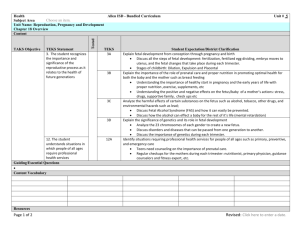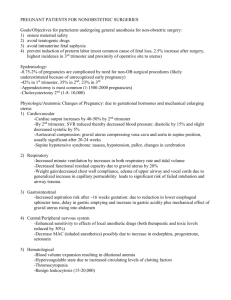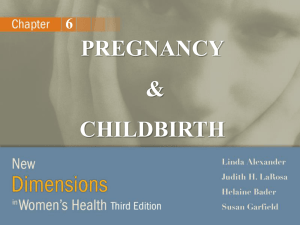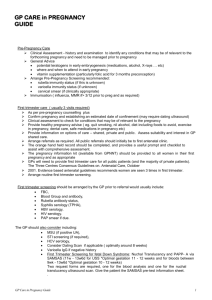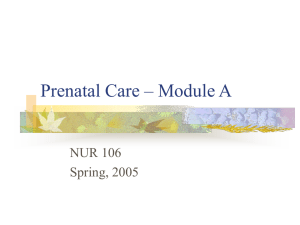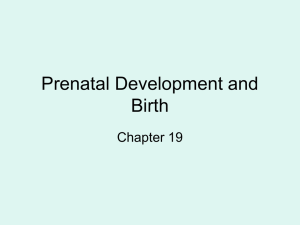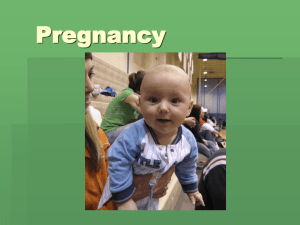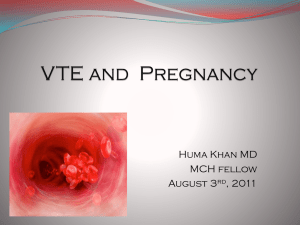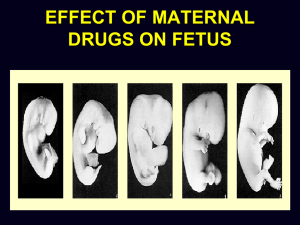Laboratory tests
advertisement
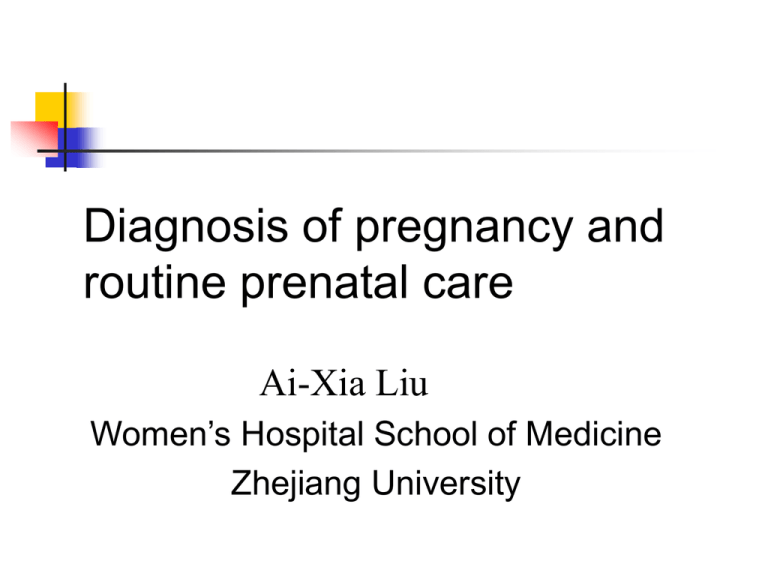
Diagnosis of pregnancy and routine prenatal care Ai-Xia Liu Women’s Hospital School of Medicine Zhejiang University Part I Pregnancy: defined as the maternal condition of having a developing embryo or fetus in the body. Oocyte and sperms Lennart Nilsson (born 1922) is a Swedish photographer and scientist. He is noted for his photographs of in vivo human embryos in 1965. fertilization Only one sperm can penetrate through the zona pellucida of oocyte Implantation 11w fetal 20w old fetal is sucking his thumb Embryo: 0-8weeks Fetus: 9-40weeks The duration of pregnancy Gestational age: It is calculated from the first day of the last menstrual period (LMP, assuming a 28 day cycle) and expressed in completed age Fertilization age: the age of the offspring calculated from the time of fertilization Gravidity: the total number of pregnancies (normal and abnormal) Parity: the state of having given birth to an infant or infants weighing ≥500g, alive or dead. (A multiple birth is a single parous experience) Live birth: the complete expulsion or extraction of a product of conception from the mother, which shows evidence of life Pregnancy diagnosis Pregnancy is divided into three phases, called trimesters First trimester: 0 - 12 weeks Second trimester: 13 - 27 weeks Third trimester: 28 - 40 weeks First trimester pregnancy Symptoms Amenorrhea: strongly suggestive of pregnancy Nausea morning sickness of pregnancy (4-12W) results from rapidly rising serum levels of HCG Fatigue: one of the earliest symptoms of pregnancy Frequent urination Signs Increased basal body temperature Breast tenderness Chadwick's sign (darkening of the cervix, vagina, and vulva), Goodell's sign (softening of the vaginal portion of the cervix), Hegar's sign (softening of the uterus isthmus), Skin change: increased pigmentation including chloasma, linea nigra, stretch marks chloasma linea nigra stretch marks First trimester pregnancy Bleeding (25%) Spontaneous abortion (25-50%) Uterine cramping with bleeding in the first trimester is suggestive of impending abortion Pregnancy test Human chorionic gonadotropin (HCG) is produced by trophoblasts from 8 days after fertilization Urine pregnancy test Serum pregnancy test: more sensitive HCG may be detected in maternal serum in 9 days Positive manifestations Fetal heart tone (120-160 BPM) Doppler device can detect at 10 weeks Positive manifestations • Ultrasound examination of fetus is one of the most useful technical way Second trimester pregnancy Symptoms General well-being: the most comfortable time for a pregnant woman Pain: stretching of pelvic structures Uterine contraction (Braxton hicks contractions) Second trimester pregnancy Abdominal enlargement: quickening: primigravida 16-20 w multigravidas 14-16 w Fetus: attains a size of almost 1000g by 28w Motion: begin at 16-20w Viability Positive manifestations Palpation of fetus (22 weeks) Leopold Maneuver to determine the fetal presentation In obstetrics, the presentation of a fetus about to be born refers to which anatomical part of the fetus is leading, that is, is closest to the pelvic inlet of the birth canal. According to the leading part, this is identified as a cephalic, breech, or shoulder presentation. Longitudinal lie Transverse lie Third trimester pregnancy Symptoms Contraction: more apparent Pain in the lower back and legs: pressure on muscles and nerves by the uterus and fetal head Lightening: descent of the fetal head weight gain: fetal grows rapidly Fetal movement: regularly, strong Part II Routine Prenatal care Prenatal care Preconception care Women who contemplate pregnancy should be evaluated for the conditions that could affect a future pregnancy Routine prenatal care Every 4 weeks during the first 28 weeks of gestation Every 2 weeks from 28 to 36 weeks Weekly from 36 weeks to delivery The first prenatal visit Usually at the first trimester, most thorough History Physical examination Laboratory tests History Obstetrical history Medical history Family history Social history Complete obstetric history Present pregnancy and menstrual history Past pregnancies Estimated gestational age(EGA), EDC The length and duration of menstruation EGA at the time of delivery or abortion Fetal outcome Mode of delivery: vaginal or cesarean section Complications: GDM, preeclampsia Medical history Previous and current medical disease Diabetes, chronic hypertension Medication Previous surgeries Blood transfusion history General history Family history Diabetes Mental retardation Genetic disorders Social history and education Physical examination Physical examinations generally consist of: Checking (mother's) blood pressure (Mother's) height and weight Pelvic exam Doppler fetal heart rate monitoring (Mother's) blood and urine tests Physical examination Pelvic examination Evaluation for abnormal vaginal discharge Performance of cervical culture Assessment of pelvic soft tissue: cervix and uterine Bony pelvis Clinical pelvimetry: pelvic inlet, midpelvis and pelvic outlet Laboratory Tests Blood screening Blood routine test Blood type (ABO and RH) Detect diseases: rubella, syphilis, hepatitis B, HIV Screening test for certain diseases according family history Diabetes screen: glucose challenge test (GCT) Laboratory tests Urinalysis: bacteria, sugar, and protein Pap smear :detection abnormal cells Infectious disease: gonorrhea, chlamydia, group B streptococcus, et al Stool test when indicated Tuberculin skin test for high risk patients Laboratory tests Neural tube defects screening testing First trimester screening (10w3d-13w6d) Nuchal translucency(NT) measurement+serum analytes Second trimester screening(15-20w) Serum analyses: AFP+HCG+estriol (uE3) Diagnostic genetic testing Chorionic villus sampling (CVS) (10-12w ) Amniocentesis ( 16-18w ) Age>35 or abnormal pedigrees Subsequent Visit Every 4w until 28(32)w Every 2w until 36w After 36 weeks, every 1 w until delivery Complicated pregnancies require closer surveillance Subsequent Visit Weight gain Blood pressure Fundal height Abdominal examination fetal size and position Fetal heart tones Edema Urine test
